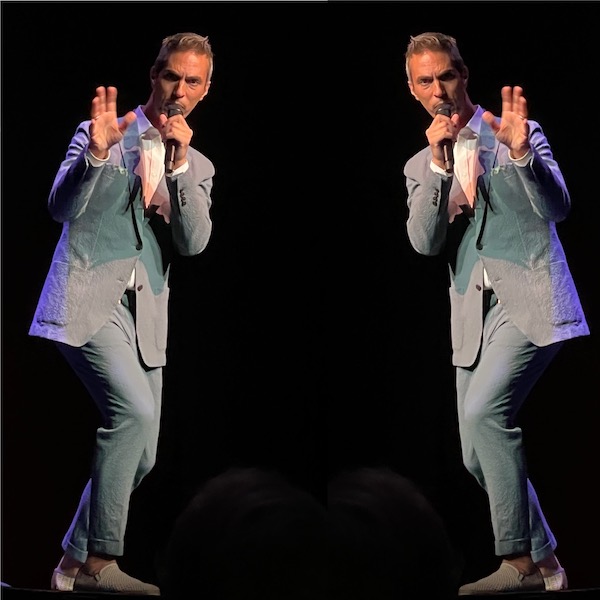
“The ability to cross boundaries of identity is something I value and that I’m grateful for,” says Ari Shapiro.
The shapeshifting Shapiro, best known as a co-host of National Public Radio’s flagship newscast “All Things Considered,” will vividly demonstrate both his values and the skills required to live up to them in upcoming appearances in San Francisco.
In a polymathic program titled “Thank You for Listening,” Shapiro, who complements his radio duties touring the world as a singer with eclectic Portland-based band Pink Martini, will perform musical numbers and tell stories inspired by his 2023 memoir, “The Best Strangers in the World.”
“I’ve always loved being able to walk between worlds and be out of my comfort zone,” said Shapiro in a recent interview with the Bay Area Reporter.
Spending his early childhood as one of the few Jews in Fargo, North Dakota and being the first out queer student in his Portland, Oregon high school primed the pump for Shapiro’s fluid movement through diverse professional and personal pursuits as an adult.
Dissolving divisions
As a journalist, Shapiro, 45, who began working at NPR as an intern in 2000 after graduating from Yale, is suspicious of what he considers artificial distinctions between “hard news” and “softer” feature stories.
He’s as passionate about interviewing writers and performers as he is about “covering Trump rallies, war zones, and presidential elections on the other side of the world.”
“I think the most important thing for a journalist is curiosity. And that’s what informs my decisions to go places where I might not immediately feel comfortable, or like I belong. I’m curious about the people who are comfortable and do feel like they belong in those spaces. And maybe over the course of going there. I eventually find a greater sense of belonging, or at least commonality, than I expected to when I began.”
The same open-minded adventurousness that characterizes Shapiro’s wide-ranging radio coverage and dedicated pursuit of his sideline singing career (A large proportion of his vacation time is spent on Pink Martini tours), also informs his participation in queer life.
In his memoir, Shapiro shares anecdotes that show him equally at home frolicking with Radical Faeries in rural Tennessee, volunteering as a board member for a queer youth organization, and spending weekends with Manhattan power gays on Fire Island. He paints a charming picture of domestic life with his husband and in Washington, D.C. along with recounting nights of dancing and drinking in locales as different as Orlando, Florida and the Greek Islands.
“I’m hardly the only person who can show up to work in a suit and tie and then hang out in shorts and a tank top on the weekend,” Shapiro said modestly. “But what is the LGBTQ community doing if we erect walls and barriers between those spaces? Part of what we’ve always fought for is inclusiveness.
Morphing across media
While happy to ignore societal siloes that feel arbitrary or unnecessary, Shapiro savors the nuanced differences in crafting work for different media.
“So often, the notes I would get from my editor on drafts of my memoir would amount to, ‘I want more of you in this.’ After more than 20 years writing stories where I was not the center of attention, I had to become comfortable with putting myself at the center.”
“The other big difference is that writing for the ear and writing for the eyes are different skills. When you’re writing for the eye, you know the reader can pause and linger and come back to reread a sentence. For radio, I write in short declarative sentences, without subordinate clauses.
“When I was reading the memoir for the audiobook, I really noticed how much more ornate and intricate the sentences that I had written for the page were compared to how I write for ‘All Things Considered’ stories.”
Some of the same core content went through further alteration as Shapiro developed his new theater show.
“When I started working on ‘Thank You for Listening’, I thought of it as a stage adaptation of stories from my memoir,” he said.
“You can still see those threads running through it, but over the course of creating it, it evolved and changed. There’s a lot of stories that I didn’t include in the book, and then there are things that I touched on which I go into greater detail about, like my fortune teller grandmother who worked at a carnival.”
(That’s right, the anchorman’s bubbe could read the news before it happened).
“And I talk about things that have happened since the book was published, including the whole experience of writing and publishing a memoir, and hosting the television show “The Mole,” which just dropped on Netflix.”
Beyond variations in content, the key difference between live performances and his other work, said Shapiro, is the immediately palpable relationship it provides with audiences.
“When I’m writing for the page or reading stories for the radio or on the audiobook, I think of my delivery as a one-to-one conversation. Even if millions of people are listening on the radio, I want it to feel like its just me and you, in your car or your kitchen, or wherever you are.
“A stage performance is a collective experience. Something that draws me to live theater and music is that they’re communal. Whatever emotions we’re feeling, we’re feeling them together, in the same room at the same time. I’ve always loved that as an audience member, and I love it as a performer.”
